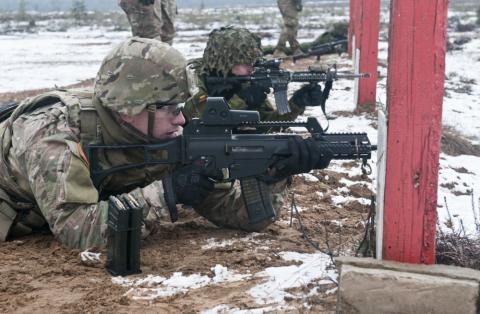Lithuania is used to maintaining national security and defense by relying on NATO allies in many ways. Such an approach helps the country save money and receive political preferences within the Alliance.
Thus, the NATO enhanced Forward Presence Battlegroup, as well as U.S. soldiers from the 1st Battalion, 9th Cavalry Regiment, 2nd Armored Brigade Combat Team, 1st Cavalry Division are the main contributors to the Lithuanian defense today.
U.S. soldiers from the 1st Battalion, 9th Cavalry Regiment, 2nd Armored Brigade Combat Team, 1st Cavalry Division based out of Fort Hood, Texas, is currently in Lithuania in support of Atlantic Resolve.
According to Lithuanian officials, this mission is a useful addition to the NATO enhanced Forward Presence Battlegroup also deployed in Lithuania.
The NATO battalion battle group trains together with Lithuanian forces and U.S. soldiers. Troops participate in live fire exercises, and some combined trench training in order to maintain combat readiness and perform complex training.
Today foreign troops on Lithuanian territory are quite common, though the local population is not always happy with their presence. Stories of inappropriate behavior in public places have caused protest.
For many local authorities foreign soldiers have become a major headache. Today, for example, the number of infected with COVID 19 foreign soldiers are higher than the number of Lithuanian military. They are often involved in drunken brawls which cause dissatisfaction and disappointment among locals.
Their criminal behavior is not only due to their bad personal qualities or poor parenting, there is a logical explanation that cannot be ignored.
A Lithuanian Plea
Lithuanian authorities appealed to NATO to enhance foreign troop presence without taking into consideration the past of those units who would be deployed in Lithuania.
Thus, the history of the the 1st Battalion, 9th Cavalry Regiment, 2nd Armored Brigade Combat Team is very long and includes combat operations in Iraq where it suffered casualties while conducting the mission.
It is well known that the number of soldiers with post-traumatic stress disorder (PTSD) and violent behavior among military personnel following deployment to Iraq and Afghanistan is very high.
Violence towards others outside military facilities is a significant problem because, for instance, the U.S.-Lithuanian agreement on the status of US troops on Lithuanian territory gives the US jurisdiction over crimes committed by its military personnel.
In other words Lithuanian police and authorities could do nothing with foreign soldiers who are responsible for heinous crimes.
Questions Going Forward
The more so, Lithuanian soldiers training together with foreign troops could adopt a pattern of such behavior.
So, there are some questions to the Lithuanian authorities:
Are you sure that foreign soldiers in Lithuania do not have post-traumatic stress disorder?
Who and how will defend Lithuania?
Are the locals fully protected from foreign troops aggressiveness and violence?
And if they do something illegal, who is to blame?
